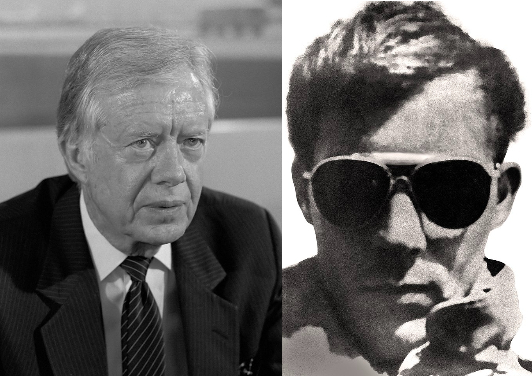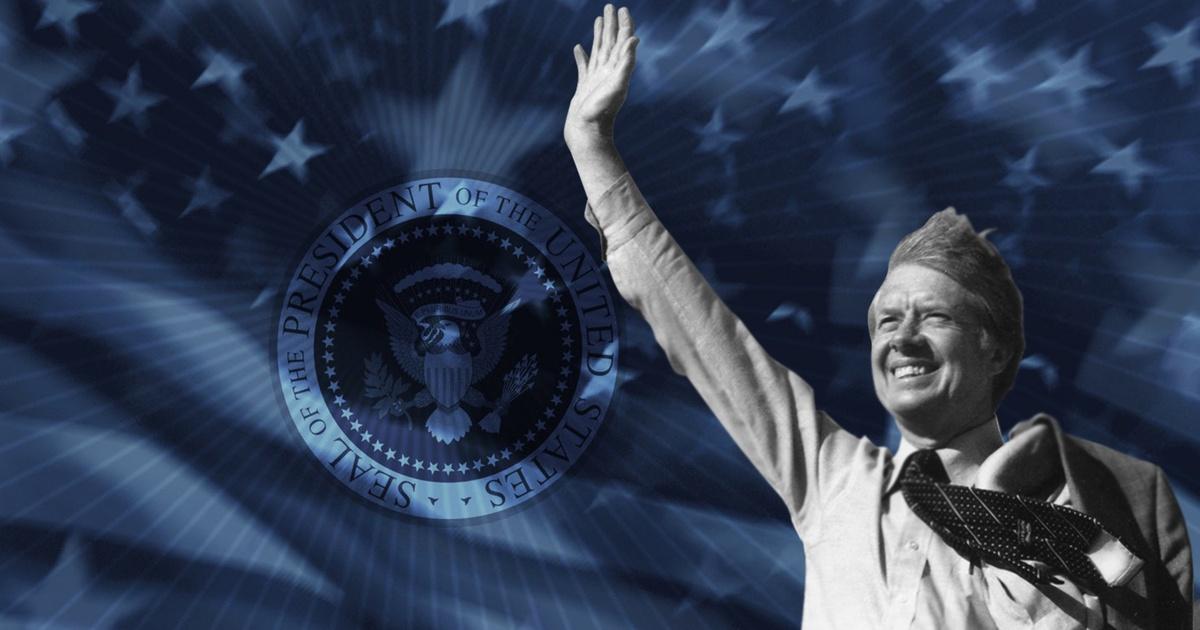Special Note: For every action, there is a reaction. As we open up 2025, Americans with self-inflicted and/or societal wounds have once again taken their anger out by driving over innocent people or setting off bombs. The great paradox here is that American veterans perpetrated these two recent incidents; citizens trained to protect us, not kill us. The traditional response will be to erect more barriers, pay for more security, and continue to treat public spaces as potential war zones, while the real preventive need is to strike at the root of the problem: unjust and unnecessary war-making, lack of full support for returning veterans, and the easier cultural paths to destruction vs. progress.
Additional note: We dedicate this issue to the memory of President Jimmy Carter, and it includes a few extra, more intriguing pieces you may have missed.
The fog of 2024 has barely lifted, and we’ve lost a giant. In this issue, I reflect on Jimmy Carter's legacy and contemplate Donald Trump's imminent return to power, a stark reminder of America's seesaw ability to judge what’s accepted for leadership. These two presidents, separated by four decades, represent dramatically different approaches to leadership and reveal how profoundly our national character has transformed.
The Leadership Contrast
Jimmy Carter, a genuine man of the land and people, came from nowhere and embodied traditional leadership virtues: integrity, accountability, and moral courage. His presidency, though often portrayed as ineffective, demonstrated uncomfortable honesty and ethical conduct. Carter's approach centered on personal responsibility and detailed problem-solving, spending long hours studying complex issues and maintaining transparent communication with the public. His decisions were not always popular, but they were based in historical necessity.

In contrast, Trump's leadership style has emphasized charisma, the art of the lie, and a disdainful approach to governance. While his supporters laud his communication style, his leadership relies heavily on whim and spin.

The Transformation of American Values
The stark difference between these leaders reflects a fundamental shift in American values. Carter's presidency emerged from the Watergate era when the nation craved integrity and moral leadership and spent many hours glued to the hearings and not wanting to believe what they were hearing. Today's political landscape, however, has reversed to a more accepting pattern of Nixonian behavior, one in which the perception is stronger than the reality.
How did this happen?
The Media Revolution
Historians will spend lifetimes analyzing what has changed. I will proffer that the most significant change is the rise of partisan media, particularly beginning with radio shows such as Rush Limbaugh and growing much larger with corporate-driven Fox News.

The disappearance of local and national newspapers, where readers consumed similar fact-based content for discussion, has given rise to more niche offerings where discussion is deemed woke. What began as a few hours of fringe radio is now a 24-hours-a-day silo and has dramatically altered how Americans process their political information. While research shows that exposure to different news sources significantly affects viewers' understanding of reality, this easy access to personal choice of a parallel universe has made facts malleable and truth subjective.
Over the holidays, I spoke with a friend visiting their aging parent. The parent, wanting to avoid confrontation, pointed to two rooms and said to his adult son, “The TV in there’s for FOX, and that one in there is for CNN.”
Social media has further fragmented our national discourse. Where Carter once held intimate town halls and face-to-face meetings, modern political communication occurs through bromance, pre-selected platforms, tweets, and viral moments. Feeds with more ballsy or entertaining clicks has made substance both boring and too time-consuming.
Historical Judgment
Carter's post-presidential work through the Carter Center and his dedication to humanitarian causes have already elevated his historical standing. Future generations will increasingly appreciate his leadership style, which focused on careful deliberation and moral consistency. He was prescient on Middle East peace where there was none, the seeking of alternative energy solutions when oil and gas prices crushed consumers, protecting vast tracks of land and water for future generations, and putting the last nail in the coffin of Soviet Russia with overt and covert actions (for which many historians still wrongly assign to Reagan).
Analysts will probably evaluate Trump's presidency through the lens of its impact on democratic institutions and social cohesion and whether done deliberately or whimsically, the term “Trump Doctrine” being used loosely. His departure from traditional leadership norms will remain a central point of historical analysis, not only by historians but also by psychologists.
The Path Forward
To make better choices in leadership, Americans must develop a more long-term approach beyond easy manipulation. If essential leadership qualities are more than a mere transaction, then we need an honest assessment of what we are accepting of and why. These qualities and the questions to be asked include:
Integrity and ethical behavior - what is the role of business and religion in developing the American psyche?
Honest communication and accountability - how has marketing gone from authenticity to image?
Vision and strategic thinking - how did long-term goals such as a “moon shot” give way to brash, influential, get-rich-quick narratives of success?
Respect for institutions and diverse perspectives - how did Americans get turned against their own public services and people?
Learning agility and adaptability - how has public education become weaponized and portrayed as a poor investment?
Conclusion
The contrast between Carter and Trump reveals not just two different leadership styles, but two different Americas. Carter's presidency reminds us of a time when character and moral leadership were deemed paramount by a public exhausted with Vietnam and with Nixon, while Trump's rise reflects a Nixonian shift toward charismatic, hubristic action regardless of merit.
As we face increasingly complex global challenges, Americans must develop and retain a more sophisticated understanding of leadership. The brilliance of our constitutional form of government has been to keep power from becoming entrenched, but it depends greatly upon a public that recognizes big things from small things and continually evolves alongside the rise of knowledge. This requires moving beyond the immediate gratification of social media soundbites and partisan news coverage to evaluate leaders based on their ability to unite, solve problems, and uphold democratic values.
The choice between these leadership styles is not merely about political preference but about the nation we are still trying to be. As we navigate an increasingly complex world, our ability to recognize and reward genuine leadership qualities is getting more difficult and may well determine our future success as a democracy.
To pass the torch of leadership to a charlatan like Trump means we have rebuked the authenticity that was Carter for an image of one.
With the passing of Jimmy Carter and the re-election of Donald Trump, historians may view 2024 as the year that American democracy died.
The outcome will be and always has been entirely up to us.
Quick NO BS Hits
To understand how a climber with big money backing can short-circuit democracy, read this quick history on how Putin came to power.
Great piece on Carter by Russell Moore of Christianity Today.
Journalist and author James Fallows on Jimmy Carter.
Douglas Brinkley piece on Jimmy Carter as an author.
July 1976 piece on Presidential candidate Jimmy Carter.
While there will be plenty to read about Jimmy Carter over the next few days, I’ve tried to include access to a few items in this issue that maybe you missed. This is one of my favorites from the great folks at OpenCulture. Watch both short videos to hear and see a side of Jimmy Carter rarely mentioned. It is further proof that Carter brought the honesty and decency he said he would, regardless of how it would affect him. Now that’s leadership.
What separates humans in the animal world is our ability to create. Each year, classic works of creativity enter the public domain, reminding us that almost all originality builds upon the works of our predecessors. I love that we have laws in place that protect such creativity and ultimately give others a chance to refresh them. If Shakespeare were alive today, I think he would be proud of what his work has led to.
This is yet another reason that the rule of law and public policy is paramount to the advancement of nations. I invite you to consider reviewing one of these public works and think about a unique twist you might put upon them. It’s stimulation for you and your brain, and who knows? The public might love it.
The final thoughts on Jimmy Carter relate to music. He had a well-known love of Bob Dylan and his song Maggie’s Farm. He knew how music often said what others wanted to say or didn’t know how to. If you have access to Kanopy through your local library, you can watch the documentary Jimmy Carter: Rock & Roll President for free. Now, here are a few words from one of my all-time favorite artists, Peter Gabriel.
I hope you enjoyed reading that piece. Take a listen to one of Peter Gabriel’s great songs coming up next. I’m also adding in another one in honor of President Carter. Despite being written in memory of Martin Luther King, Jr., I find this song appropriate to honor his fellow Georgian.
Always remember, Carter experienced the best and the worst in the name of public service, and he kept going with resolve to do the most good that he could do.
Be a good human in this new year.








